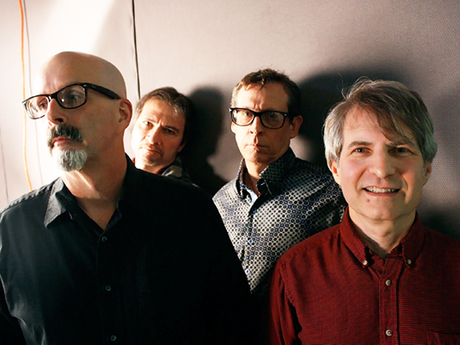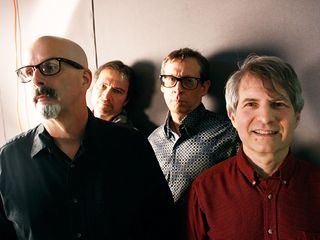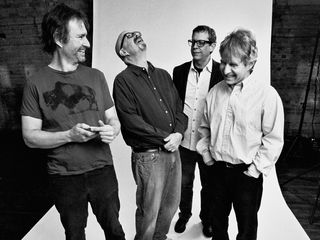

Making music after 30 years are the original dB's (from left): Peter Hosapple, Gene Holder, Will Rigby and Chris Stamey.
Before there was alternative rock, there was "college rock," and during the early '80s, one of the biggest bands in that sub-genre was The dB's, four Big Star devotees out of Winston-Salem, North Carolina who would prime people's ears for the sound of "jangle pop" and open the doors for a host of like-minded groups, most notably REM.
Comprised of co-singers and guitarists Peter Holsapple and Chris Stamey, bassist Gene Holder and drummer Will Rigby, the dB's were the proverbial critics' darlings who couldn't catch a break with mainstream audiences. They creating a scene, but it was one that would ultimately transcend them. After releasing two sterling albums, Stands For Decibels and Repercussion (both at the time available in the US as imports; the band was signed to the UK indie Albion Records), Stamey left to pursue a solo career. Holsapple, Holder and Rigby soldiered on for a few years with an array of floating fourth members before breaking up in 1988.
Holsapple and Stamey reteamed as touring and recording mates in 1991, and in 2005, the original dB's fell back into place. Gradually, they began recording new material with longtime cohorts Scott Litt and Mitch Easter, and the result is the vibrant and wonderfully inspired Falling Off The Sky (out 12 June via Bar None Records), an album that feels like a natural continuation of a musical dialogue started years ago but one that now offers huge, unexpected and appealing twists.
Before heading out on a handful of pre-release shows, Peter Hosapple sat down with MusicRadar to talk about the band's rich history and what it was like to get the old gang back together.
It's been a long time. Do you feel like it's a brand-new "old" band?
"It's the same guys, obviously, so it feels comfortable. We have that unspoken communication thing that happens with people who grew up together. It's funny - even though we hadn't spent a lot of time together in recent years, when we got together again it was like we were still in eighth grade. I don't mean that in a stupid, juvenile way. It's more about our feelings and our experiences, and most of them relate to the music we all grew up with."
Get the MusicRadar Newsletter
Want all the hottest music and gear news, reviews, deals, features and more, direct to your inbox? Sign up here.
Let's touch on that. For many people, the dB's were one of the first bands that ignited something in them to want to form their own groups. Who did that for you?
"For us, it was The Beatles, Big Star, Dwight Twilley, the first Tom Petty record, Blue Ash, Badfinger - music like that excited us to no end. As you can imagine, growing up in North Carolina, it was really all about the Allman Brothers and Marshall Tucker. As good as those things were, it wasn't speaking to us in a very powerful way."
Above: The dB's - That Time is Gone (2012)
When you and Chris Stamey met, how long did it take for the two of you to recognize each other's musical strengths?
"Well, we met in sixth or seventh grades, maybe even earlier. With Chris, I knew that he was friends with Mitch Easter, who was considered an insider with what we called the 'combo corner guys,' all the guys who had bands. I longed and aspired to be one of them. I remember being afraid of talking to Mitch - he seemed so incredibly cool. Chris was my entry to people in that clique.
"When Chris decided he'd get a bass, everybody was all over him: 'He's gonna play in my band. No, he's gonna play in my band.' I sort of won out, which was handy. I don't know why he liked me. We kind of came up together, though."
How would you describe your collaboration over the years?
"It's not like two guys sitting in a room with pencils and guitars, beating out a song. Chris' strengths are production and engineering work. He's a superb studio-phile. It's hard to be objective about yourself and figure out what you bring to the table, but I think I bring a certain element of blues singing and 'street-guy' attitude to what we do. Chris and I are like Felix and Oscar in many ways. We complement each other."
Even though you're all from North Carolina, the band technically formed in New York City.
"That's right. Chris moved up first to play bass with a group called The Erasers. Then Alex Chilton was looking for a bass player, and since Chris knew all the Big Star songs, he threw his cards in with him. Then, after about a year or so, Chris called Gene, Will and Mitch, and he did a show with them and decided to start a band. I got called in to audition to play keyboards. I tried out and waited a long time to find out if I made the band. I'm still waiting, in fact! [laughs] Nobody ever told me anything. It's been a while, but I think it's safe to say I made the cut.
"New York felt right for us - we were all New York-o-philes. We loved the Dolls and The Velvet Underground and all that stuff. Doing the band in North Carolina would've been a hard climb."
So how did The dB's get signed to a UK label then?
"We tried to get signed to an American label. That would've been the logical thing to do with bands like The Knack getting signed at the time. We went to an English label because the producer we worked with, Alan Betrock, who was also the editor of New York Rocker magazine, knew the guys from Albion Publishing.
"They talked about doing a publishing deal, and that led to them putting out our first record, and that was good because it got us touring in the UK and everything. Surprisingly, our first two albums for Albion didn't come out in the States until 10 years later, by which time we'd broken up."
Above: The dB's - Neverland (1982)
The dB's always seemed like a band on the verge of getting big, but for whatever reason, real fame never happened. How frustrating was that?
"I don't think we were ever really in danger of getting big. I mean, we wanted to try. [laughs] It's weird - a lot of people around us were putting out records that were really great, and we thought fans were listening. Whether they were… I don't know. Things were always weird for The dB's. Whatever it was, certain things were just off-kilter. I guess that's what made us the band we were then."
When Chris left the group in 1983, was that a big blow to you?
"Well, it wasn't an acrimonious split. I think if you look at his first solo albums, it's obvious he wanted to move beyond the standard two guitars/bass/drums approach. And I would go to his shows, which were fascinating. We stayed friends. But yeah, sure, it was a blow. I'm not a good chief, I'm a better follower, and suddenly I had to be a leader and a frontman and a businessman - none of which I see myself as."
Several years later, after The dB's broke up, you toured as a sideman with REM. What was that like?
"That was great. It was a lot of fun, actually. The dB's had opened for REM for years and on a lot of different tours, so we were all very friendly. Going out as a part of the band was pretty easy, and it was nice to sleep in a bus. [laughs] It was the same as my going out and touring with Hootie, which I also did - there's an element of not having to lay your entire soul on the line because the songs aren't yours."
The new album was recorded over a long period of time. Any reason for that?
"At the time we started making it, we weren't all living in the same place. And we were all touring with various people and doing lots of different things. When we did the band for the first time, we weren't family men - nobody had to cart their kids off to karate class or what not - and now that we're, uh, middle-aged [laughs] our responsibilities are a bit different. Things aren't the party they once were."

What's next for The dB's? "We're ready for world domination," Holsapple jokes.
The band has worked with Scott Litt and Mitch Easter in the past. What do they bring to the music?
"Well, Scott, having produced Repercussion and then going on to work on tons and tons of great hit records, he's got a real unerring ear. He's got a real clue as to the internal sound of The dBs. That was a big concern to us: With all the time that's passed, what were we going to sound like? What should we sound like? Scott has a handle on that.
"Mitch, for all intents and purposes, has always been a part of The dB's, even though he's never been a member. We've always worked together. The first thing that came out of Drive-In Studios, right after we helped put the glass in between the studio and the control room, was a beautiful mono mix of our song Black And White. Mitch is such an idea man. He makes things happen."
You mentioned your blues leanings earlier. One can hear that in the song That Time Is Gone.
"I like that song a lot. It's a different kind of sound for The dB's, even though it sounds like us. If you go back to the last official dB's album, The Sound Of Music, there's a bit of that, sort of my John Henry. There's a lot of traditional song structure in what we do."
You and Chris harmonize beautifully on Far Away And Long Ago.
"Thanks. It's something we came by naturally when I came into The dB's - suddenly, there were two official vocalists. For my money, two-part harmonies are the way to go. Everly Brothers, the Louvin Brothers, John and Paul or Peter and Gordon - I would rather listen to them than anybody else. That's one of my biggest issues today's alt-country - not just that they have Auto-Tuning, but that they add the automatic third harmony. Two vocals keep the song outlined."
The song I Didn't Mean To Say That is pretty mature and introspective. Is that something you could have written years ago?
"No, because I was too much of a jerk back then. It's a fairly humble song - there's humility in it. If you look at my earlier songs, there's some of that cocksure rock 'n' roll bullshit. This song is me offering an apology. You say things in the heat of the moment when the wound is fresh - we've all done it."
You've always had a bold and bright guitar sound. What would you say your ultimate guitar-amp combination would be?
"I like the Big Star sound of the Stratocaster in the out-of-phase position through a Hiwatt amp - that's always good. There's nothing like a Les Paul Junior through a little Bluesbreaker combo, too. The P-90 is always a great, throaty kind of pickup. My main guitar is an Esquire now. It was a Telecaster and I took out the neck pickup. I put that through a Hot Rod Deluxe, and it really chews it up and spits it out. The guitar has a Lindy Fralin pickup, which is pretty hot."
Now that you've reunited, what's the plan for The dB's?
"Oh, world domination, of course! [laughs] We didn't have success at an early age, we didn't buy those dump trucks full of cocaine, so we're ready for world domination. Seriously, though, I think we'll do as many dates as we can and get people to see us and hear what we're doing. We'd love to get on some of the TV shows that still feature bands. I don't think The dB's ever had their 'late-night debut,' so it'd be nice to have folks in Lincoln, Nebraska see us. Or anywhere."
Joe is a freelance journalist who has, over the past few decades, interviewed hundreds of guitarists for Guitar World, Guitar Player, MusicRadar and Classic Rock. He is also a former editor of Guitar World, contributing writer for Guitar Aficionado and VP of A&R for Island Records. He’s an enthusiastic guitarist, but he’s nowhere near the likes of the people he interviews. Surprisingly, his skills are more suited to the drums. If you need a drummer for your Beatles tribute band, look him up.
Most Popular








